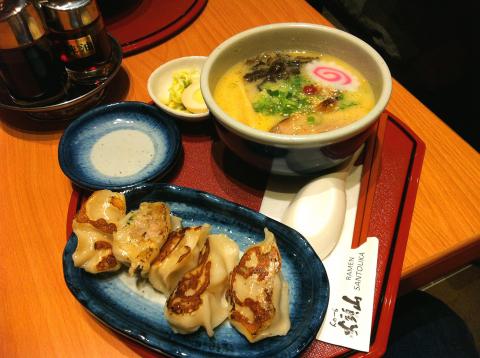If you’re going to visit Hokkaido Ramen Santouka (山頭火), a Japanese ramen chain that just opened its first Taiwanese branch in the basement food court of the Sogo Department Store on Fuxing South Road (復興南路) in Taipei, my first suggestion would be to wear a comfortable pair of shoes. A book to pass the time isn’t a bad idea, either.
Long queues of diners curious about Santouka’s self-declared “legendary” noodle soups have been the norm since the restaurant first opened in early April. The wait can take up to one hour, and the lines rival those of Din Tai Fung (鼎泰豐) at the other end of the hall.
On a visit last week, I thought I would beat the lines by arriving around 11am, when the department store opened. I was wrong. I got there at 11:10am, and already the line consisted of 25 people. It took half an hour before I was seated.

Photo: David Chen, Taipei Times
So is it worth the wait? If you’re a ramen fanatic on a constant search for the perfect bowl, then a trip is in order. I don’t consider myself an aficionado, but it was easy to appreciate the quality of the store’s specialty, the shio ramen (literally salt ramen 鹽味拉麵, NT$190, NT$220 and NT$260 for small, medium and large bowls, respectively). The broth lives up to the marketing hype on Santouka’s Web site: it does indeed taste like it was made from pork bones that had been simmered for 20 hours. The soup is hearty and well balanced, and not overly creamy as the typical Japanese ramen broth tends to be. And the requisite garlic flavor in this concoction is subtle rather than overpowering.
Such attention to detail extended to the rest of the bowl. The noodles tasted fresh and were cooked to a nice chew texture; a few thin slices of bamboo shoots and wood ear mushrooms added some crunch, and a red pickled plum, perched on top like it was a glace cherry on an ice cream sundae, was there for tartness. But what stole the show were the two slices of grilled pork, which melted in the mouth like the classic Chinese dish dongpo pork (東坡肉).
The servings in Santouka’s Shio Ramen are just a tease, though. There’s a deluxe set called toroniku ramen (山頭火特製麵, NT$290, NT$320 and NT$350), which is made from choice cuts of pork jowl meat.
Other noodle soup choices include shoyu ramen (soy sauce broth with noodles, 醬油拉麵)and miso ramen (味噌拉麵), both of which cost NT$190 for a small bowl, NT$220 for a medium and NT$260 for a large. A spicy miso ramen option (辣味噌拉麵) is also available for NT$10 extra.
Santouka recommends a medium-sized bowl for a stand-alone meal. But there is also a wide variety of side dishes, including salmon sashimi salad (鮭魚刺身沙拉, NT$160 for a single order), fried pork cutlet (日式炸豬排, NT$180) and Japanese-style pot stickers (煎餃, NT$160). I ordered the latter and found them to be a nicely done and lighter version of the Northern Chinese variety. They have a thinner skin and are cooked until the bottom is crispy.
These dishes are all available as part of combo sets that come with a small bowl of noodles (your choice of broth flavor) and a boiled egg, with prices ranging from NT$330 to NT$360.

On April 26, The Lancet published a letter from two doctors at Taichung-based China Medical University Hospital (CMUH) warning that “Taiwan’s Health Care System is on the Brink of Collapse.” The authors said that “Years of policy inaction and mismanagement of resources have led to the National Health Insurance system operating under unsustainable conditions.” The pushback was immediate. Errors in the paper were quickly identified and publicized, to discredit the authors (the hospital apologized). CNA reported that CMUH said the letter described Taiwan in 2021 as having 62 nurses per 10,000 people, when the correct number was 78 nurses per 10,000

As we live longer, our risk of cognitive impairment is increasing. How can we delay the onset of symptoms? Do we have to give up every indulgence or can small changes make a difference? We asked neurologists for tips on how to keep our brains healthy for life. TAKE CARE OF YOUR HEALTH “All of the sensible things that apply to bodily health apply to brain health,” says Suzanne O’Sullivan, a consultant in neurology at the National Hospital for Neurology and Neurosurgery in London, and the author of The Age of Diagnosis. “When you’re 20, you can get away with absolute

May 5 to May 11 What started out as friction between Taiwanese students at Taichung First High School and a Japanese head cook escalated dramatically over the first two weeks of May 1927. It began on April 30 when the cook’s wife knew that lotus starch used in that night’s dinner had rat feces in it, but failed to inform staff until the meal was already prepared. The students believed that her silence was intentional, and filed a complaint. The school’s Japanese administrators sided with the cook’s family, dismissing the students as troublemakers and clamping down on their freedoms — with

As Donald Trump’s executive order in March led to the shuttering of Voice of America (VOA) — the global broadcaster whose roots date back to the fight against Nazi propaganda — he quickly attracted support from figures not used to aligning themselves with any US administration. Trump had ordered the US Agency for Global Media, the federal agency that funds VOA and other groups promoting independent journalism overseas, to be “eliminated to the maximum extent consistent with applicable law.” The decision suddenly halted programming in 49 languages to more than 425 million people. In Moscow, Margarita Simonyan, the hardline editor-in-chief of the